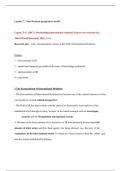Lecture 7 - Non-Western perspectives on IR
Capan, Z.G. (2017). Decolonising international relations?Links to an external site..
Third World Quarterly, 38(1), 1-15.
Research aim – what ‘decolonisation’ means in the field of International Relations
Outline
1 – Eurocentrism of IR
2 – spatial and temporal geo-political divisions of knowledge production
3 – decolonization of IR
4 - conclusion
1 The Eurocentrism of International Relations
- The Eurocentrism of International Relations has become one of the central concerns of what
can broadly be termed critical perspectives.
- The field of IR has dealt widely with the issue of its Eurocentric roots and how it has
manifested itself through its many ‘avatars’ in its central concepts such as sovereignty,
security and the Westphalian international system.
-Criticisms of the Eurocentrism of the narratives of IR have primarily focused upon the
absence of other actors and how their agency was being silenced. (e.g the story of the
‘expansion’ of the international society is written in a linear manner where the ‘others’ join
into the system established by Europe.
,-The narratives of International Relations establish ‘Europe’ as the central referent and main
actor of history, and events outside of Europe become derivative of events that have already
happened in Europe.
- It was often overlooked that the story of the expansion of international society is also the
story of the dissolution of empires, anticolonial struggles and the process of juridico-political
decolonisation. How the‘international society’was joined and socialised into took many forms
and encapsulated many motivations.
- The discussions on sovereignty, human rights and international law demonstrated that the
concepts taken to be central to the understanding of International Relations had developed in
interaction with areas outside of Europe.
-The ‘absences’ in the narrative of IR also about how understandings of the history of
International Relations were narrated and have underscored how Eurocentrism is constitutive
of International Relations. (e.g The way in which the Haitian Revolution has entered into dis-
cussions about history and International Relations - The Haitian Revolution, as the first anti-
slave revolution occurring around the same time as the French and American Revolutions,
does not constitute a central a place in narratives of democracy, human rights and modernity).
-This is not because the Haitian Revolution was not known in its time, but rather because it
has been forgotten as a consequence of ‘the disciplinary discourses through which knowledge
of the past has been inherited’.
- As such, it is not just a matter of underlining the importance of Haitian Revolution in the
formation of modernity but rather inquiring into the reasons for its absence in the first place,
because it is that absence’ and silence that ‘is constitutive of the very idea of modernity and its
use in socio- logical interpretations of the contemporary world
,- These discussions about the ‘absences’ in the narrative of International Relations have
opened up space in order to reimagine the field of International Relations.
-Amitav Acharya; approaches the‘non-Western’ and/or‘post-western’endeavours‘as part of a
broader challenge of reimagining IR as a global discipline’.
- This reimagining encapsulates a pluralistic universalism that recognises and respects
diversity, is premised upon world history, encompasses existing approaches, includes area
studies, abandons exceptionalism and recognises multiple facets of agency.
- Even though the 'non-West' is a ‘perilous but unavoidable terrain’, how this terrain is
navigated needs to be mindful of the spatial and temporal alterities that produce and sustain
Eurocentrism as a mode of knowledge.
- Eurocentrism is a mode of knowledge and a paradigm for ‘interpreting a (past, present and
future) reality that uncritically established the idea of European and Western historical
progress/achievement and its political and ethical superiority’.
- As such, what makes Eurocentrism possible and enables it to continue being reproduced in
narratives of nternatinal relations is its re-articulation, reproduction and re-enactment through
the colonial matrix of power that is maintained alive in books, in the criteria for academic
performance, in cultural patterns
The coloniality of IR
- International Relations as a discipline defines political time and space through the Western
conceptions of modernity.
- International Relations is constituted upon spatial and temporal differences that were
constituted by the ‘discovery’ of the ‘New World’, and continues to define time and space
through these binaries and dichotomies.
, - The alterity that was established with the discovery established a‘geo-cultural division of
knowledge production’ both spatially and temporally.
-These differences and binary oppositions posit the West in a ‘flexible positional superiority’
of being the knower, of being human, of being civilised.
-What is written for the ‘others’ is always a story of a lack and a story of catching up.
- It is this ‘geo-cultural division of knowledge production’ established with the ‘discovery’
that con- itutes the ‘philosophical foundation for the totalizing, cultural, political, economic,
and legal systems of knowledge that have sustained Western hegemony’.
- This system of knowledge is maintained through the continued designation of ‘difference’
within the geo-political and geo-cultural organisation of world politics, whether it is
civilised/barbarian, modern/ traditional, advanced/backward.
-The field of International Relations is predicated upon these constitutive alterities and
continues to reproduce them.
- As such, the Eurocentrism of International Relations is rooted in the alterities established
with the ‘discovery’ of the ‘New World’, and to understand Eurocentrism ‘in terms of the way
in which certain patterns of interpretation are produced and contested’, it is important to
question the coloniality of International Relations.
Conepts of coloniality and colonial matrix of power
-Quijano – coloniality of power
-Walter Mignolo – colonial difference
-Ramon Grosfoguel – heterarchies
-Nelson Torres – coloniality of being
-Maria Lugones – coloniality of gender





